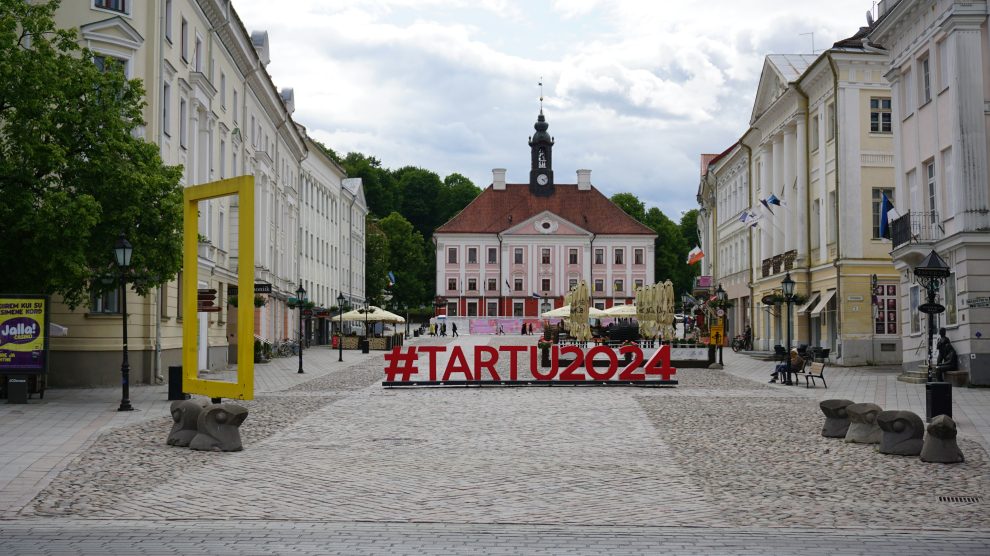Ongoing GPS jamming in the Baltic has led to all flights to Tartu in Estonia being cancelled. With Russia the likely culprit, Baltic foreign ministers are calling for a joint NATO response.
The departures and arrivals board at Tartu Airport is currently a depressing sight. In what should be a year of joy and celebration for Estonia’s second-largest city, a European Capital of Culture, the only daily flight—a Finnair service from Helsinki—has been suspended until at least May 31 over safety concerns.
Last week, two Finnair flights to Tartu were forced to return to Helsinki because of deliberate GPS interference, colloquially referred to as jamming. The route had only reopened at the beginning of April having been suspended during the Covid-19 pandemic.
- Economy in focus: Estonia
- The Estonian delivery robots set to take over the world
- Estonia tops Future of Emerging Europe Sustainability Index
“The GPS interference in Tartu forces us to suspend flights until alternative solutions have been established,” Finnair said on Monday, adding that it hoped to find an alternative solution to allow its planes to land in the city safely.
Blame for the jamming has been placed squarely at the door of Russia. Last weekend, the foreign ministers of Estonia, Latvia and Lithuania all warned separately at the of the dangers of GPS jamming across the whole Baltic Sea region, which has increased in recent weeks.
“If someone turns off your headlights while you’re driving at night, it gets dangerous. Things in the Baltic region near Russian borders are now getting too dangerous to ignore,” Gabrielius Landsbergis, Lithuania’s foreign minister, told the Financial Times.
Time for NATO to act
Following the Finnair decision to suspend flights to Tartu—which is likely to have a real impact on the university city’s economy in its showpiece year— Estonia’s Foreign Minister Margus Tsahkna said it is a “fact” that Russia is jamming GPS devices in Baltic airspace, adding that he views the jamming as “a hybrid attack” and that he plans to broach the subject with NATO allies and EU partners.
“We have to call things by the words they are. And it is a fact that Russia is influencing GPS devices in our airspace, not just in Estonia, but in our whole region. And it is international news when international airlines announce that they cannot land in one place or another because of Russian interference,” he told Estonian public broadcaster ERR.
Last month, Germany also said Russia was very likely behind a series of disturbances affecting navigation in the Baltic region. The German Defence Ministry pointed to the Russian exclave of Kaliningrad as the source, though it declined to give any details citing “reasons of military security.”
In January, Dana Goward, a member of the US Presidents’s National Space-Based Positioning Navigation and Timing National Advisory Board, wrote that, “jamming presents a risk to thousands of commercial aircraft, and as international pressure has so far failed to halt the interference, it’s time for NATO to act—proportionally.”
GPS interference has also been encountered in the Black Sea, the Caspian Sea and the eastern Mediterranean. It is perpetrated in two forms: jamming, which makes it impossible for pilots to know their precise location using GPS; and spoofing, whereby the aircraft’s systems are tricked into representing the wrong position.
There’s still the train
While most larger airports—including Lennart Meri Airport in Estonia’s capital Tallinn—use alternative approach methods, some smaller airports, such as Tartu, require GPS.
European Capital of Culture Tartu 2024 is the most important cultural event to take place in Estonia for several years.
The year-long programme—which encompasses Tartu and all of Southern Estonia—includes more than 1000 events showcasing the region’s cultural heritage and diversity.
For the time being at least, visitors wanting to enjoy it all will need to travel to the city by train from Tallinn.
Photo by Marek Lumi on Unsplash.
Unlike many news and information platforms, Emerging Europe is free to read, and always will be. There is no paywall here. We are independent, not affiliated with nor representing any political party or business organisation. We want the very best for emerging Europe, nothing more, nothing less. Your support will help us continue to spread the word about this amazing region.
You can contribute here. Thank you.


